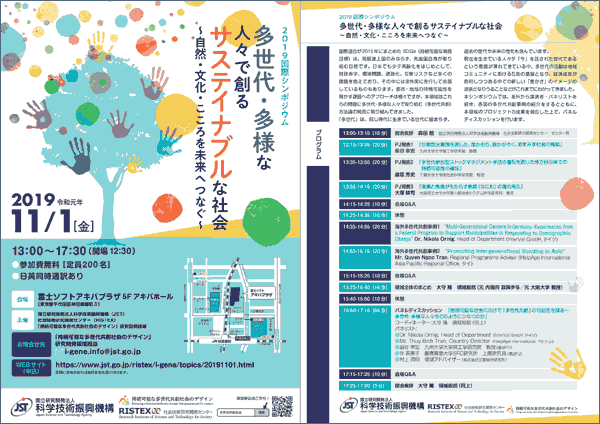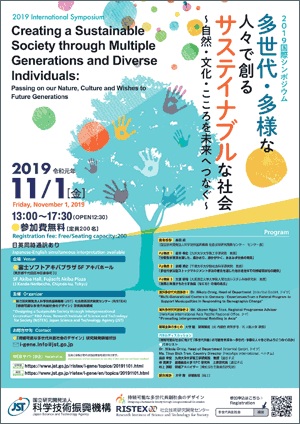Japanese | English
イベント・トピックス
多世代・多様な人々で創るサステイナブルな社会
~自然・文化・こころを未来へつなぐ~ を開催致しました。
多数ご参加いただきありがとうございました。
【開催概要】
日時:令和元年11月1日(金)13:00~17:30(開場12:30)
会場:富士ソフトアキバプラザ 5Fアキバホール(地図)
主催:国立研究開発法人科学技術振興機構(JST)社会技術研究開発センター(RISTEX)
「持続可能な多世代共創社会のデザイン」研究開発領域
使用言語:日本語・英語 ※日英同時通訳あり
参加費:無料
定員:200名
【開催趣旨】
国際連合が2015年にまとめたSDGs(持続可能な開発目標)は、発展途上国のみならず、先進国自身が取り組む目標です。日本でも少子高齢化をはじめとして、財政赤字、環境問題、過疎化、災害リスクなど多くの課題を抱えており、その中には諸外国に先行して直面しているものもあります。都市・地域の持続可能性を脅かす課題へのアプローチは様々ですが、本領域はこれらの問題に多世代・多様な人々で取り組む(多世代共創)方法論の開発に取り組んできました。「多世代」は、同じ時代に生きている世代に留まらず、過去の世代や未来の世代も含んでいます。現在を生きている人々が「今」を託された世代であるという意識が薄れてきている中、多世代の活動は、地域コミュニティにおける互助の基盤となり、経済成長が飽和しつつある中での新しい「豊かさ」のイメージの源泉となりうることなどがこれまでにわかってきました。
本シンポジウムでは、海外から講演者・パネリストを招き、ドイツの「多世代の家」や貧困高齢者を支援する国際NPO「HelpAge International」などの多世代共創事例を紹介するとともに、本領域のプロジェクトの成果を報告した上で、パネルディスカッションを行います。
【プログラム】
| 開始 | 終了 | [分] | 内容 |
|---|---|---|---|
| 13:00 | 13:15 | 15 | ◆開会挨拶 |
| 13:15 | 13:35 | 20 | ◆PJ発表1 |
| 13:35 | 13:55 | 20 | ◆PJ発表2 |
| 13:55 | 14:15 | 20 | ◆PJ発表3 |
| 14:15 | 14:25 | 10 | 会場Q&A |
| 14:25 | 14:35 | 10 | 休憩 |
| 14:35 | 14:55 | 20 | ◆海外多世代共創事例1 |
| 14:55 | 15:15 | 20 | ◆海外多世代共創事例2 |
| 15:15 | 15:25 | 10 | 会場Q&A |
| 15:25 | 15:40 | 15 | ◆領域全体のまとめ 大守 隆 領域総括(元 内閣府 政策参与/元 大阪大学 教授) 発表資料(PDF:223KB) |
| 15:40 | 15:50 | 10 | 休憩 |
| 15:50 | 17:15 | 85 | ◆パネルディスカッション |
| 17:15 | 17:25 | 10 | 会場Q&A |
| 17:25 | 17:30 | 5 | ◆閉会挨拶 大守 隆 領域総括(同上) |
※プログラムは変更になる場合があります。
【登壇者紹介】
大守 隆(おおもり たかし)
領域総括(元 内閣府 政策参与/元 大阪大学 教授)
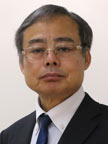
国家公務員として国土庁では地方都市整備に取り組み、経済企画庁では科学技術を初めて採り上げた経済白書を執筆した。国立環境研究所の研究会にも参加した。内閣府発足後は、GDP統計の改善を行ったりOECDの対日経済審査の首席代表を務める一方で、ソーシャルキャピタルや幸福度に関する研究を経済社会総合研究所の一つの柱として立ち上げた。退官後は、外資系証券会社のチーフエコノミスト、APEC(アジア太平洋経済協力)の経済委員会議長、東京都市大学環境情報学部教授を歴任。オックスフォード大学経済学博士。
Nikola Ornig
Head of Department, InterVal GmbH, Germany

Nikola Ornig is leading a department at a research and consulting company in Berlin, specializing in the evaluation and scientific accompaniment of governmental programs. She holds a doctoral degree in Social Sciences from the University of Graz/Austria and focuses her research on demographic change, social participation and integration. The evaluation of the Federal Program on Multigenerational Centers on behalf of the Federal Ministry for Family Affairs, Senior Citizens, Women and Youth is currently her main project.
Thuy Bich Tran
Country Director, HelpAge International, Vietnam
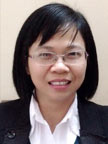
Ms Thuy Bich Tran has 20 years experience working in development and 10 years working in the area of ageing. She is one of the founders of the community based, appropriate, comprehensive and affordable model in Vietnam, so called Intergenerational Self-Help Club (ISHC), which promotes healthy and active ageing in Vietnam. The ISHC has now become the national model which has been, and will be replicated, widely by government and non-government organizations in the coming years.
Quyen Ngoc Tran
Regional Programme Adviser, HelpAge International Asia Pacific Regional Office, Thailand
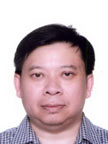
Quyen has more than 30 years experience working in research, emergency response and community development. With respect to ageing, he has been working with HelpAge since 2003. His roles in the region is to provide technical support in areas relating to age friendly livelihood, disaster response and preparedness, healthy and active ageing, care and establishment and capacity building of intergenerational and sustainable community-based organizations in the Asia-Pacific region.
島谷 幸宏(しまたに ゆきひろ)
九州大学大学院工学研究院 教授
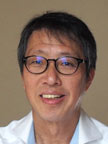
1955年山口県生まれ。土木研究所、国土交通省九州地方整備局の武雄河川事務所等を経て現在に至る。河川工学、河川環境が専門であるが、小水力発電、合意形成などにも詳しい。最近は、グリーンインフラ、あまみず社会の研究に鋭意取り組んでいる。
倉阪 秀史(くらさか ひでふみ)
千葉大学大学院社会科学研究院 教授
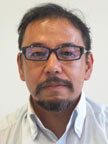
1964年三重県上野市(現:伊賀市)生まれ。1987年東京大学経済学部卒。同年4月環境庁(現・環境省)入庁、地球温暖化対策、循環型社会政策、環境基本法案立案、環境影響評価法案立案などに従事。1998年4月に千葉大学に移る。環境政策論、環境経済論など専攻。2017年4月より現職。著書に『なぜ経済学は経済を救えないのか--資本基盤マネジメントの経済理論へ』(詩想舎)『政策・合意形成入門』(勁草書房)『環境を守るほど経済は発展する』(朝日選書)『エコロジカルな経済学』(ちくま新書)『環境政策論』(信山社)など。
大塚 耕司(おおつか こうじ)
大阪府立大学大学院人間社会システム科学研究科 教授
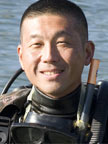
1963年大阪生まれ。大阪府立大学大学院博士前期課程船舶工学専攻修了後、大阪府立大学大学院工学研究科助手、講師、助教授、教授を経て、2016年から現職。1993年博士(工学)の学位取得。主に大阪湾をフィールドとして、閉鎖性海域の環境修復に関する研究、海陸一体型バイオマス有効利用システムに関する研究などに携わり、2013年に瀬戸内海環境保全功労者表彰(議長表彰)受賞。海洋深層水利用学会副会長、日本船舶海洋工学会理事、生態系工学研究会理事。
伴 英美子(ばん えみこ)
慶應義塾大学SFC研究所 上席所員
慶應義塾大学環境情報学部、大学院政策・メディア研究科 非常勤講師
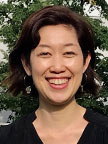
高齢者介護従事者の人的資源開発を専門とし、研究・教材開発に取り組む。2008年慶應義塾大学大学院政策・メディア研究科後期博士課程修了。医療法人社団慶成会 青梅慶友病院 理事長室に勤務。2015年よりRISTEXのプロジェクト“未病に取り組む多世代共創コミュニティの形成と有効性検証”(2014年度~2017年度)に参加。神奈川県湯河原町で多世代の居場所づくりに携わる。2016年ゆがわらっことつくる多世代の居場所を開設。2018年に“居場所”の運営団体として、一般社団法人ユガラボを設立。理事に就任する。
村上 清明(むらかみ きよあき)
領域アドバイザー(株式会社三菱総合研究所 常務研究理事)
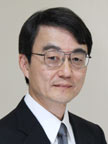
1978年東京大学工学部卒。1983年コーネル大学大学院修士課程修了。1978年、日本国有鉄道入社。新幹線総局、技術計画室等を経て、1987年三菱総合研究所入社。社会資本整備、科学技術政策、未来社会分野の研究に従事し、2012年12月より研究理事、2016年12月より現職。現在、JST プログラムマネージャーの育成・活躍推進プログラム メンター、成蹊学園サステナビリティ教育センター 客員フェロー、成蹊大学丸の内ビジネス研修、石川県次世代産業創造会議委員を務める。
森田 朗(もりた あきら)
国立研究開発法人科学技術振興機構 社会技術研究開発センター センター長
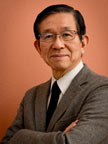
東京大学法学部卒業。千葉大学、東京大学、学習院大学で教鞭を執った後、2014 年から 17 年まで国立社会保障・人口問題研究所所長。17 年 4 月から津田塾大学総合政策学部教授。 18 年 4 月からは国立研究開発法人科学技術振興機構社会技術研究開発センター長。 広く行政、公共政策の研究に従事するとともに、多数の政府審議会等にも参加。 厚生労働省中央社会保険医療協議会 会長も務め、医療政策、人口問題を中心に、よりよい政策形成のあり方について研究。
【発表要旨】
PJ Presentation 1:
“Distributed Rainwater Management for a Sustainable Well-being Society”
Yukihiro Shimatani, Professor
(Faculty of Engineering, Kyushu University)
The current centralized water management system is efficient but lacks in coordination across different uses of water. Consequently, a comprehensive approach to natural disaster risks, such as localized downpours and flooding, is difficult. In addition, as water management systems are not visible to the general public, they can hardly attract attention, which makes this issue left unattended in society.
This project proposes an “Amamizu (Rainfall) Society,” which is equipped with a comprehensive water cycle system that encompasses flood control, water utilization, environmental preservation and quality of life for the local people.
As a decentralized subsystem to complement the current water management system, we will take an approach to preserve rainwater locally and make it percolate into the ground, with the participation of multigenerational and diverse stakeholders in the region. The process of storing and using rainwater, including the context of beauty and traditional culture, contributes to raising public awareness of the importance of water management and the restoration of rich local ecosystems.
PJ Presentation 2:
“Ensuring Sustainability at Local Government Level through Promoting Implementation of Multigenerational Participatory Stock Management Methods”
Hidefumi Kurasaka, Professor
(Graduate School of Social Sciences, Chiba University)
Our project believes that sustainability is ensured by keeping human, man-made, natural and social capital stocks that support our society in healthy forms. In this project, the Future Chart issuing program was developed. This gives predictions for each basic municipality whether or not it will be possible to care for those various capital bases in 2040 if the current trend continues. Since it was released in October 2017, it has exceeded 20,000 downloads. The future situation is described in the Future Chart and can be changed by various policies.
In this project, the Future Workshop method has been also developed. In this workshop, based on information grasped in the Future Chart, younger generations such as junior and senior high school students think about policies on local sustainability from the standpoint of the mayor in 2040, and make recommendations to the current mayor.
PJ Presentation 3:
“Restoring a Beautiful and Rich Inner Bay through ‘Fish Local, Eat Local’”
Koji Otsuka, Professor
(Graduate School of Humanities and Sustainable System Sciences, Osaka Prefecture University)
Due to world population growth, sustainability of food and water supply is under threat. Therefore, we need to reassess the role of inshore fishing as a source of protein, which can be obtained with limited usage of water and energy. However, a declining habit of eating local fish has led to a reduced demand for inshore fishing, and decreasing number of fisherpersons.
In this research and development project, focusing on the fish catch in Osaka Bay, which used to be known as the “Sea of Naniwa (fish garden)”, we develop a regional model to create a virtuous cycle of people, products and money. Specifically, we recycle fish scraps for pebble-like fish aggregating devices to attract fish, and to develop cooking recipes using local fish through intergenerational co-creation. In addition, we establish a distribution channel for local fish and develop technology to maintain freshness to be applied there. With these activities, we realize community-based fishing and fish-eating culture.
Case Study on Intergenerational Co-creation Overseas 1:
“Multi-Generational Centers in Germany - Experiences from a Federal Program to Support Municipalities in Responding to Demographic Change”
Nikola Ornig, Head of Department
(InterVal GmbH, Germany)
For more than ten years the Federal Ministry for Family Affairs, Senior Citizens, Women and Youth has supported “Multi-Generational Centers” - central meeting places where social cohesion between generations is actively promoted. Co-funded by municipalities and districts across Germany, the “Multi-Generational Centers” help to develop solutions for challenges of demographic change on a local level.
This presentation will outline the core concepts of the work of “Multi-Generational Centers”. It will take a closer look at the cross-generational approach, the “open meeting place” and different services and activities tailored on the needs of people of different age and cultural background living in the respective municipalities. Further, it will address the importance of voluntary involvement for the success of the Centers. People of all ages and different backgrounds have the possibility to volunteer in “Multi-Generational Centers” under professional guidance, thereby strengthening their own social and professional skills as well as supporting the social infrastructure in their municipalities.
Case Study on Intergenerational Co-creation Overseas 2:
“Promoting Intergenerational Bonding in Asia”
Quyen Ngoc Tran, Regional Programme Adviser
(HelpAge International Asia Pacific Regional Office, Thailand)
When people are raised in different times and are at different stages in their life, their values and perceptions of the world can be quite different. This can lead to reduced interaction, misunderstanding and even conflict with one another. In addition, generation gaps are widening due to fast changing lifestyle, globalization, migration and diverse ideologies. Because of these gaps, it is important to have a special effort to promote greater understanding and relationship between the generations.
HelpAge has been working in the Asia and Pacific region for more than 15 years to promote Intergenerational Bonding (IB). This presentation will share HelpAge’s IB initiatives in seven Asian countries (India, Sri Lanka, Thailand, Vietnam, Bangladesh, Indonesia and Cambodia). It will also look into the specific benefits IB initiatives brings to both young and older people and will share strong evidence of the wide and long-term impact of IB initiatives.
【お問合せ】
国立研究開発法人科学技術振興機構(JST)社会技術研究開発センター(RISTEX)
「持続可能な多世代共創社会のデザイン」研究開発領域担当
TEL:03-5214-0133


